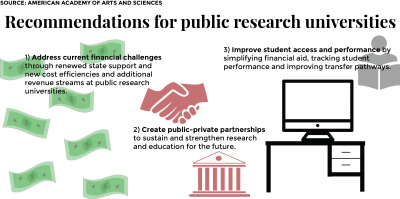
Public research universities need to address financial challenges, create partnerships with government and philanthropic communities and focus on serving students to ensure a higher quality education, according to a report published Thursday by the American Academy of Arts and Sciences. The same recommendations can also apply to private universities like Boston University, the report’s co-chair said.
Robert Birgeneau, co-chair of “The Lincoln Project: Excellence and Access in Public Higher Education,” said the challenges private and public universities face are increasingly similar.
“The difference between Boston University and Michigan State University is now narrowing, because with the Michigan State funding decreasing to 10 percent, the characters of student body [in private and public universities] are similar,” Birgeneau said. “They both depend heavily on student tuition, so they face similar pressure.”
Out of the report’s three main recommendations, Birgeneau said it is crucial for private universities such as BU to address students’ needs. These include easing students’ financial burden and simplifying the financial aid application process.
“For both public and private universities, tuition just cannot keep going up indefinitely,” Birgeneau said. “We have to keep control cost for students … and we feel strongly to improve financial aid dramatically for low-income students.”
More than 16 million students apply for financial aid every year by filling out the Free Application for Federal Student Aid, which consists of 108 questions and 88 pages of instructions, the report stated.
“The completion of [FAFSA] is overly complicated and burdensome, especially for low-income families and first-generation college students,” the report stated.
The report also recommends that universities create public-private partnerships to sustain financial support. Local government and private industries should support higher education institutions because they produce research that eventually contributes to economic innovation, the report suggested.
“Over the past two decades, public universities have launched efforts to stimulate economic development and to provide outlets for students and faculty to commercialize their research findings,” the report stated.
The third recommendation to the higher education institutions, according to the report, is to focus on balancing its financial report, especially when state economic growth slows down.
State support for public higher education for full-time students decreased by approximately 30 percent from 2000 to 2014, and the report therefore suggested that it is necessary for institutions to find new revenue streams.
Many public universities chose to cut academic programs and increase tuition to make up for the decrease in state funding, the report stated. But these methods undermined the public trust in universities and will only lead to further decrease public funding, the Lincoln Report suggested.
Although BU is a private institution, several students said the administration should adopt some recommendations the report brought up, such as lowering tuition and improving students’ access to higher education.
Gabrielle Shokrian, a junior in the Questrom School of Business, said the university is demanding more tuition in order to seem more prestigious. She said the university should cooperate with the private sector for extra funds.
“It is getting harder to get accepted [by BU], which makes BU look like a better school,” Shokrian said. “[Administrators] are going to raise the price to keep up that standard.”
Sheila Yee, a freshman in the College of Arts and Sciences, said the university should create more scholarships by partnering with local companies and cutting administrative costs.
“President [Robert] Brown is one of the highest paid university presidents in the U.S., so [the university] could reduce the amount of money he earns to help the kids who don’t have enough financial aid,” she said.
Sarah Fahey, a freshman in CAS, said scholarships offered at BU require higher grade-point averages than at other universities, making it challenging for students to keep a scholarship.
“There are a lot of scholarship opportunities at BU, but they also are pretty demanding for a lot of students,” Fahey said. “[The university] should either lower the tuition or make it easier for students to maintain their scholarships.”




